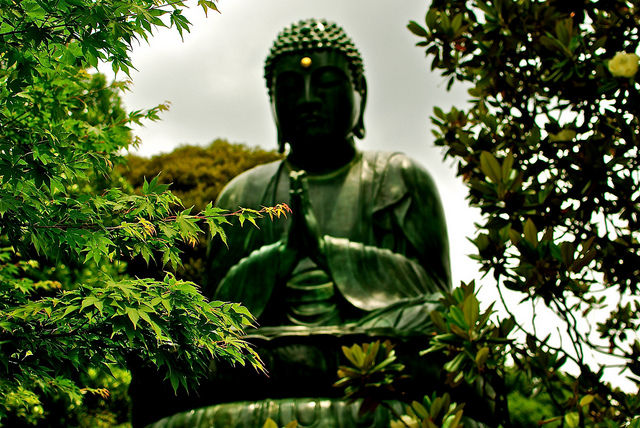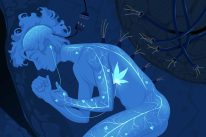
“Remember, we all stumble, every one of us. That’s why it’s a comfort to go hand in hand.” ~Emily Kimbrough
I just finished my second family visit for the year, and I have three more planned.
For years after I first moved away a decade ago, I only came home around the holidays.
I’d caused and dealt with so much drama that it felt easiest to hide with my pain and shame where I couldn’t hurt people or be hurt by them. I felt safest seeing my family in small doses, because there would be less time for me to mess things up—and fewer opportunities for them to reject me.
During one of my trips last year, I noticed that things felt different. Since I was visiting more frequently, it no longer felt like we were all on our best behavior for each other.
There was some friction, and minor annoyances, and even some major frustrations—all things I’d completely avoided for years.
At first I thought this was a sign I shouldn’t have been opening myself up. Everything felt predictably cordial when I visited infrequently, contained my true feelings, and engaged with people on a mostly superficial level.
Then I realized I was grateful for the change.
The intermittent tension, occasional irritations, and general sense of vulnerability were all signs that I was actually relating to people, not merely sharing space with them.
It may seem crazy to suggest conflict can be a good thing, but I’ve learned that even healthy, loving relationships inevitably involve a little friction.
If we’re showing our true selves, stumbling and learning a little every day, and spending time with other people who are doing the same, we will inevitably clash every now and then.
We will disagree. We will get irritated. We will feel disappointed. And we may do or say things we later come to regret. So long as we’re not in abusive relationships, none of these things have to indicate there’s something wrong.
Every time we don’t see eye to eye, we have a chance to practice expressing ourselves without judging each other. Every time we get on each other’s nerves, we have a chance to practice calming ourselves instead of blaming each other.
Real relationships are messy, and it can feel instinctive to resist that—but what a mistake that would be. It’s only when we stop learning together that we start to grow apart.
Photo by KittyKaht
About Lori Deschene
Lori Deschene is the founder of Tiny Buddha. She started the site after struggling with depression, bulimia, c-PTSD, and toxic shame so she could recycle her former pain into something useful and inspire others to do the same. You can find her books, including Tiny Buddha’s Gratitude Journal and Tiny Buddha’s Worry Journal, here and learn more about her eCourse, Recreate Your Life Story, if you’re ready to transform your life and become the person you want to be.
- Web |
- More Posts













 Though I run this site, it is not mine. It's ours. It's not about me. It's about us. Your stories and your wisdom are just as meaningful as mine.
Though I run this site, it is not mine. It's ours. It's not about me. It's about us. Your stories and your wisdom are just as meaningful as mine.
You are so right, Lori. I am so thankful you write these posts as they are so insightful and reinforcing. You are a wise woman and amazing.
I’m so thrilled they help Lynn! Thank you for the kind words. =)
I forgot
How very true that is…Thank you for sharing this, it comes to me at a very needed time in my life!
You’re most welcome. =)
I believe all knowledge is the result of conflict. I challenge myself to see conflict as an opportunity to grow and learn, rather than use all those avoidance techniques I have honed through the years
For years I related to my parents as if they were characters playing roles in my life. And they were.
I was a character in THEIR dramas as well, playing the part of the dutiful son who never challenging them when I secretly disagreed. Their “truth” about family matters was not my truth. I figured Mom was always in denial and reshaped reality – even about me.
I wasn’t exactly right about that. She wasn’t JUST reframing situations.
You see, maybe four years ago, I decided to “get real” with my mother. My father had already slipped into senility and was a lost cause. But my mother still had “honest-relationship” potential, and that was my goal.
To my surprise, when I told Mom everything I had held back through my growing up years, she listened and listened some more. We then exchanged points-of-view, reevaluating all those sensitive family issues from the get-go.
Interesting… My mother turned from being a character I wrote about in my novels to a flesh and blood individual I had underestimated and misunderstood.
Knowing Mom as I do now, I understand why so many people admire her. To me, she had just been Mom. Now she’s a lady I respect and thoroughly like.
So guess what… It’s never too late to get to know your folks.
Irv
That’s so beautiful Irv. How wonderful you’ve gotten to know your mom in this way. Thank you for sharing this here. =)
After giving people half a lifetime of chances, I don’t think that being related should guarantee you constant admission into someone’s life, not with a long-standing history of dramatic and/or violent nonsense. Some people are very intent in casting you as a character in a drama where they are the main character, and will never waver from that scripted dialogue until it no longer serves them.
I have to protect my little family from harmful and deliberately hurtful people, and whether they are related or not shouldn’t matter.
I understand your perspective. It’s unfortunate, but sometimes family relationships are toxic and unhealthy, and it’s simply best to create some distance (whether it’s short-term or long-term). Your “little family” is fortunate to have you looking out for them. =)
Hello Lori, not commenting on the above but wanted to say I’m thinking of you as you have your procedure done. Sending you lots of love, light and positive energy. Be kind to yourself and ease back slowly. Kate xx
Thanks so much Kate! I so glad it’s finally here. I’m sending love, light, and positive energy right back to you. =)
This is such a REFRESHING perspective. Thank you for your wisdom!
You’re most welcome! =)
”
Real relationships are messy, and it can feel instinctive to resist that—but what a mistake that would be. It’s only when we stop learning together that we start to grow apart.”
LOVED this part! Thanks for the great read!
You’re welcome. Thank you for reading and commenting!
Lori,
You are so insightful and wise!
For years I tried your route with my family. After many years of extending the olive branch I decided to forgo having any type of relationship with them, move on and tak care of myself and my son. I realize there comes a time when you have to walk away, walk away to save yourself otherwise you’ll continue to endure the toxicity of being involved in those particular relationships. I’m a better person, mother and friend because I chose who enters my life. At times I do wish things were different , but soon shake myself out of it knowing I did and made the right decision in my life. It is refreshing that you were able to continue on with your family, feel proud 🙂
Thanks Connie! I know how hard it can be to make that kind of choice, and I really admire that you were able to recognize and honor your needs in that way.
Wow, this is such a timely article! Yesterday at our family easter gathering, I finally stood up to my dad, who’s been a bully – intellectually and physically – to the family for years. i didn’t do it very skillfully, but I did it. I feel shame and regret for how I expressed myself at the same time that what i expressed is something that’s been brewing for decades. I’m struggling with how to proceed, but realizing that the messy muck is where the healing will happen, not in pretending his abuse never occurred, which is what we’d been doing up until now. Thanks for this!
You’re most welcome Melissa. I’m sure it wasn’t easy to initiate that conversation, especially since you’ve been harboring these thoughts for years. Even if you aren’t thrilled with how you confronted him, it must be a liberating feeling to have initiated this conversation. I’m sending you love and light as you move into the healing process!
I must have a karmic link with Tiny Buddha ~ more often than not, the articles here always come on time when I need it the most! Thanks so much Lori :))
You are most welcome!
I really like this thought.
Opening ourselves up, going beyond the superficial level with another person, that’s a scary thing. And when the inevitable relationship hiccups happen as a result, I often find it so easy to escape back into cordiality-no-matter-what, just to keep the peace. My peace.
What you’re describing is brave — allowing for, accepting, the “messy” in relationships. I have often found it to be harder work to be the real me and then work at the relationship, but when I really think about it, it’s just as hard to maintain that superficial veneer.
Thanks for the reminder that it’s worth it to go for it.
I enjoyed this article tremendously. You have got wise insights.
For a time, I wanted to avoid having relationships. I found them just too difficult to cope. But eventually, I made myself stay to work things out. I became better and better in handling differences. As you’ve pointed out, it is when growth happens.
Thank you for sharing!
Hi Lori,
I have been touched by the readings on your site and just came across your post that you would be in the hospital having surgery – and you asked for any “newbies” to sent you best wishes. Well, thank you for all your inspirational thoughts; they have helped me tremendously over the last several months with “breaking of the shell”. In my case, I refer to it as being able to have finally opened the door and am now in the painful process of shutting the door behind me by looking at what the cost to the people around is to leave the door open. As a scientist – I spend most days looking at data, or regulations – it takes me a while to transfer to the other side of the brain – but the journey has been tremendous. Painful, pleasureful – but at least in my mind something that I have indeed felt – and not left me emotionless. Best wishes for a speedy recovery!
Lori, You most likely are reading this on the road to recovery from surgery – congratulations for facing your demons in this post and in your personal life with the health issues!
I love reading the comments people post almost as much as your posts, and it is comforting to know that there are others facing the same levels of abuse and conflict from toxic people. It makes the journey just a little bit easier to know that it is not that I am unlovable (as my parents always assert) – I am lovable – it is simply that in their world, I am not. No amount of increasing frequency of visits will change that (and I am unwilling to put myself in harm’s way any longer).
It’s refreshing to know that some relationships have hope and I can live my life vicariously through the successes of others. If you can heal from your toxic relationships, it gives the rest of us hope that someday, somehow, someway, maybe we can also be whole, despite what others believe.
Wishing you continued success!
relating is learning. nice sharing, lori. thanks.